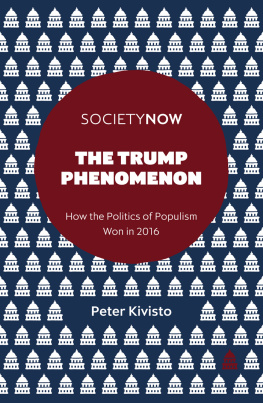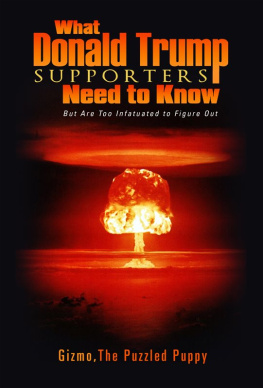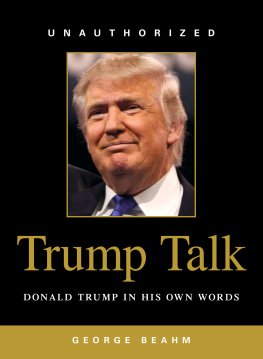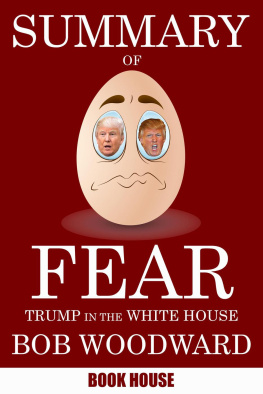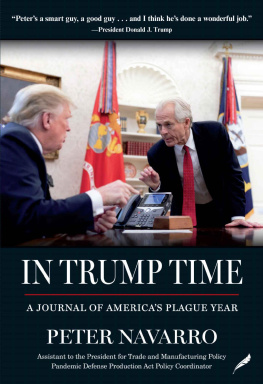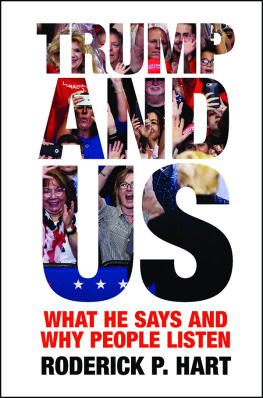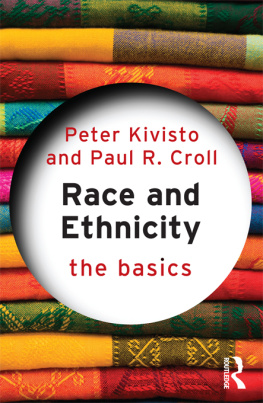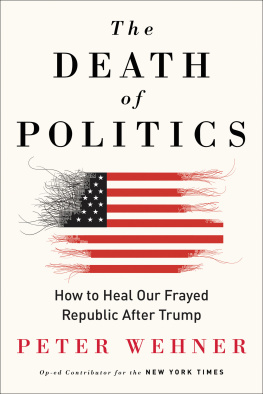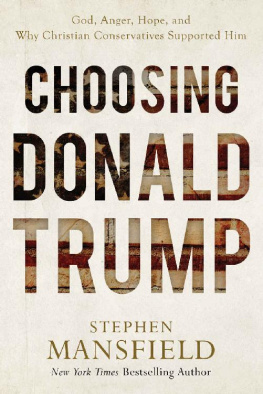THE TRUMP PHENOMENON
How the Politics of Populism Won in 2016
SOCIETYNOW SERIES
SocietyNow: short, informed books, explaining why our world is the way it is, now.
The SocietyNow series provides readers with a definitive snapshot of the events, phenomena, and issues that are defining our 21st century world. Written by leading experts in their fields, and publishing as each subject is being contemplated across the globe, titles in the series offer a thoughtful, concise, and rapid response to the major political and economic events and social and cultural trends of our time.
SocietyNow makes the best of academic expertise accessible to a wider audience, to help readers untangle the complexities of each topic and make sense of our world the way it is, now.
THE TRUMP PHENOMENON
How the Politics of Populism Won in 2016
BY
PETER KIVISTO
Augustana College and St. Petersburg State University
United Kingdom North America Japan
India Malaysia China
Emerald Publishing Limited
Howard House, Wagon Lane, Bingley BD16 1WA, UK
First edition 2017
Peter Kivisto, 2017
Reprints and permissions service
Contact:
British Library Cataloguing in Publication Data
A catalogue record for this book is available from the British Library
ISBN: 978-1-78714-368-5 (Print)
ISBN: 978-1-78714-367-8 (Online)
ISBN: 978-1-78714-920-5 (Epub)
Dedicated to Congressman John Lewis who has proven his decency and courage throughout a lifetime and the memory of Ramon Casiano who never had the chance
ACKNOWLEDGMENTS
During the summer of 2016, Philippa Grand and I discussed the possibility of a short book on what we assumed would be the rise and fall of Donald Trump. The idea was to write the book in the not-too-distant future. On November 9 we spoke again and agreed that I would begin writing at once. I did. In between these two dates, Nick Harney invited me to speak at the University of Windsor about the Trump candidacy. Even though my talk took place less than two weeks from the election, the assumption I held in August remained, though with a certain level of anxiety that was widely shared. It is to both Philippa and Nick that I owe a huge debt of gratitude for kick starting this project.
During the election season, the transition period leading up to Trumps inauguration on January 20, 2017, and the first 75 days of the administration I have had conversations and email exchanges with numerous people in the United States and Western Europe that have proved to be immensely helpful in coming to terms with what for us was both unexpected and unwelcome. Several people read all or some of the manuscript and offered their criticisms and insights, including Dag Blanck, Steve Dawdy, Thomas Faist, Kay Herrala, Susan Kivisto, Joel Phillips, and sten Wahlbeck. Others have aided in less direct, but nevertheless much appreciated ways. This list includes academic colleagues, students, friends, and family members. At the risk of leaving out names, I want to express my gratitude to the following: Richard Alba, Jeffrey Alexander, Fathimatha Ali, Bob Antonio, Imam Saad Baig, Paolo Boccagni, Clara Caldwell (who at age 88 took part in the Womans March in Washington, DC, on January 21, 2017, along with her daughter, granddaughter, and great granddaughter), John Caldwell, Rev. Robin Caldwell, Angie Carter, Naomi Castro, Rev. Jeffrey Clements, Paul Croll, Cheryl Erdmann, Don Erickson, Nancy Foner, Mary Hall, Lena Hann, Katie Hanson, Beth Hartung, David Hill, Carrie Hough, Ella Iacoviello, Corrie Jandourek, Shirley Johnson, Adam Kaul, Aaron Kivisto, Katie Kivisto, Sarah Kivisto, Sonja Knudsen, Auvo Kostianen, Lauren Langman, Joe McDowell, Irene Mekus, Rachel Moody, Ewa Morawska, Donald Munro, Sara Munro, Wendy Ng, Niko Pyrohnen, Andrey Rezaev, Fatima Sattar, Keila Saucedo, Pasi Saukonen, Giuseppe Sciortino, Jean Sottos, Vince Thomas, Rhys Williams, Jake Wirtala, and Kathy Wirtala.
CHAPTER 1
INTRODUCTION
On November 8, 2016, American voters elected Donald J. Trump to become the 45th President of the United States. He was a candidate who had been widely criticized, described as authoritarian in his leadership style and whose psychological fitness for office was frequently called into question, with mental health experts concluding that his behavior reveals what could be an undiagnosed personality disorder. American voters elected him despite Trump being viewed as an unusual candidate running a highly unconventional election campaign. They did so even though negative views of him have been as high as 70%, which suggests that some people who viewed him negatively nevertheless voted for him. They did so even though he was a central figure over several years in stoking the birther conspiracy theory that sought to delegitimize the election of the nations first black President. They did so even though his bullying and name-calling of his Republican rivals was uncivil, revealing a lack of respect for those he competed against for the nomination. They did so even though his braggadocio is adolescent and incessant (claiming, e.g., that his IQ is one of the highest and that he has the worlds greatest memory). They did so even though Trump demonized Mexicans as criminals, rapists, and drug dealers and suggested that the Mexican government was responsible for orchestrating their migration to the United States. They did so even though he called for a ban on all Muslims entering the country, a violation of constitutional protections of religious freedom.
They did so despite his repeated threats to send Hillary Clinton to prison, the sort of threats one expects to hear from cult-of-personality dictators, but not from a candidate vying for election in a democratic nation. They did so even though a standard part of Trump campaign rallies and in numerous tweets was to call reporters dishonest, scum, slime, and liars. They did so even though he repeated conspiracy theories and gained support from far right groups. They did so even though Trumps frequent use of his Twitter account was often viewed as revealing a lack of self-control.
They did so despite a history of misogyny, and in bragging that was caught on a hot mike that because he was a celebrity he could sexually assault women. They did so even though he was accused of mocking a reporter with a physical handicap. They did so even though he claimed Senator John McCain was not a war hero because after his plane went down during the Vietnam War, he ended up a prisoner of war. They did so despite his verbal attacks on the Khan family after Mr. Khan had spoken at the Democratic National Convention Muslim Americans and a Gold Star family whose middle son, a commissioned officer in the US Army, was killed in Iraq. They did so even though his saber rattling has unnerved high ranking members of the military and the intelligence community. They did so despite a history of investigations and reportage on his business career that questioned Trumps own claims regarding his business acumen. They did so even though at the Republican Party convention, Trumps self-belief led him to contend that in addressing the problems confronting the nation, I alone can fix it. They did so even though his repetitious claim that he would make America great again was never followed up with realistic policy proposals. Rather, they appeared ready to believe that he was going to spend massively on infrastructure and on building up the military while simultaneously slashing taxes and containing the deficit. Unlike the majority of adult Americans who did not vote for Trump, those who did appeared to be willing to engage in a form of magical thinking.




